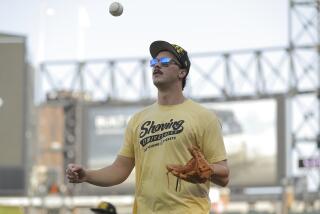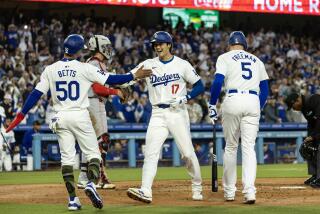BASEBALL / ROSS NEWHAN : Butler’s Ashburnian Career May Be the Last of Its Kind
- Share via
Statistically and stylistically, Brett Butler’s career best resembles that of another prototype leadoff hitter and center fielder, Richie Ashburn.
“We came out of the same litter,” Ashburn, the Philadelphia Phillies’ center fielder for 15 years and now a team broadcaster, said by phone.
“I looked at Brett and saw myself.”
Not bad. Ashburn was elected to the Hall of Fame by the veterans’ committee last year.
Butler’s current concern, beating cancer, is more significant, of course, than the Hall of Fame. But whether he has played his last game or not, he may be the last of a breed.
In an era when even leadoff men are bulking up and taking home runs to the bank, the bat-controlling, base-stealing, bunting, work-the-count, take-a-walk, singles-hitting catalyst has become a rare commodity.
“Brett was a throwback,” Ashburn said. “He recognized the things he does best and turned them into an asset.
“There are a lot of guys out there who should approach it the way Brett did but don’t. I don’t know why.
“I guess they think they can make more money hitting home runs, but to do what I did, what Brett does, is partly a state of mind.
“You have to say, ‘This is the hitter I am and I’m going to take advantage of my speed, my size. I’m going to choke up, cut down on my swing, level it out, hit line drives, hit the ball on the ground, quit trying to be the power hitter I can’t be.’
“I admired Brett for a long time and told him that. I probably know him better than any visiting player. We talked a lot about style and approach. He always had questions about how I went about it, insights he’d put to use.”
Ashburn took a .308 batting average for 2,189 games to Cooperstown. Butler has batted .291 in 2,103 games.
Ashburn had 2,574 hits in 8,365 at-bats. Butler has 2,274 in 7,823. In addition:
--Walks: Ashburn 1,198, Butler 1,083.
--Runs: Ashburn 1,322, Butler 1,303.
--Stolen bases: Ashburn 234, Butler 542.
--Doubles: Ashburn 317, Butler 269.
--Triples: Ashburn 109, Butler 128.
--Home runs: Ashburn 29, Butler 54.
--Runs batted in--Ashburn 586, Butler 559.
At a listed 5 feet 10 and 170 pounds, Ashburn twice led the National League in batting, with a .338 average in 1955 and a .350 average in 1958, and led in hits three times, with totals of 221, 205 and 215.
Butler had a career high of 192 hits with the San Francisco Giants in 1990 and a career-high .314 average with the Dodgers in 1994.
However, he is the only National League player to have led the league in singles for four consecutive seasons, starting in 1990, and he led the league in infield hits for the last six seasons. He had 280 bunt hits before this season and had 30 or more steals in 12 of the last 13 seasons.
“As a third baseman, you could never get the advantage on him,” said Tim Wallach, a former Dodger teammate who tried to defend against Butler while playing for the Montreal Expos. “If you played back too far, he’d bunt. But if you came in too far, he’d slash the ball past you. Some guys can do one or the other, but he was the best at doing both.”
Said Tony Gwynn, the best hitter of Butler’s generation, “You’d see him get in the box . . . I mean, he was like 5 foot 8 and 150 pounds and he’d just tick you off. He’d get on base any way he could. He’d take a walk, he’d be patient, he’d work the count all the way to the end. It seemed like every time up it was 3 and 2. He was a pest. Everybody calls him a pest. He was just very good at what he does.”
Everything Butler did takes constant practice, experience and insight, Ashburn said. Deadening the bunt. Drawing the infield in. Setting pitchers up. Knowing what to look for. Going the other way or up the middle. Learning how to pull the inside pitch. Not giving in to left-handers.
“There was a time later in my career, through experience and practice, when I’d have a full count and we needed a baserunner, that I could stand up there all day and foul off pitches,” Ashburn said. “I never missed. If I had ever missed and it cost me an at-bat, I would never have done it again, but I never missed.
“I don’t see guys trying to do that, but I saw situations where it looked like Brett was trying to do it.”
Of the center fielder whose statistics are comparable, Ashburn said, “It’s sad, but if Brett goes after this cancer like he did opposing pitchers, and you know he will, I’d bet we’ll see him out there again.”
LEE-WAY
The surest way for the Angels to defuse their closer controversy would be by trading Lee Smith. No easy task. If there is a market for a high-salaried, 38-year-old, all-time save leader coming off knee surgery, it’s limited to teams that believe they can win their division title and need only a proven closer. Are there any?
Probably only the Houston Astros, who seem capable of running away with the race in the tepid NL Central if they could straighten out their bullpen.
Before Saturday, Houston relievers were 5-9 and had blown four of 11 save opportunities. Reputed closer Todd Jones had six saves and three wins, which he got after he had blown saves.
“We’ve got some pretty good arms. They’ll get it done,” Manager Terry Collins said.
Wishful thinking?
The Astros would probably jump at Smith if the Angels, aching for a starter with their rotation devoid of Mark Langston and now featuring the suspect trio of Jason Grimsley, Scott Sanderson and Dennis Springer, would take Greg Swindell, allowing Houston to move a top prospect, Billy Wagner, into Swindell’s place.
But that doesn’t excite the Angels. There’s Swindell’s $4.5-million contract, besides the strained groin that has kept him on the disabled list since April 19 and his 30-31 record in three years with the Astros.
“I’d be interested in Lee Smith if the Angels were giving him away, but they’re not going to do that and I can’t take on that salary,” Astro General Manager Gerry Hunsicker said. “I think Todd Jones is going to get the job done for us.”
GHOST WRITER
Despite positive indications of baseball’s recovery, there has been a dark aspect to the season.
There were the deaths of John McSherry and Michelle Carew, and the possible loss of three of the game’s top performers and ambassadors: Kirby Puckett, because of glaucoma; David Cone, because of an aneurysm in an artery near his right shoulder, and Butler, because of cancer.
There was also the latest embarrassment from Cincinnati Reds’ owner Marge Schott, who praised Adolf Hitler’s early years as German chancellor and then apologized under pressure from baseball officials.
Now it turns out that Schott’s statement of apology was written by broadcaster Bill Cunningham of WLW, the Reds’ flagship station.
Cunningham denies it, but colleagues at his own station have gone on the air and ripped him for doing it. In addition, the station had the statement on the air 90 minutes before it was released through baseball’s New York office.
In his response to Schott’s apology, acting Commissioner Bud Selig said baseball would continue to monitor the situation. He and other officials may not have to wait long for Schott to put foot back into mouth. They are nervous about a Sports Illustrated story on Schott that is expected this week or next. The interviewing was done before Schott went on ESPN, and the early report is that “Marge was typically Marge.”
BALLOT BONUS
Julio Franco could be griping but isn’t. After all, the Cleveland Indians are paying him nicely. They welcomed him back from Japan with a two-year, $4.5-million contract. That they included a $50,000 bonus if he was selected to the all-star team, but then didn’t submit his name for the ballot, isn’t worth a controversy, he figures. The Indians, as a concession to Eddie Murray’s future Hall of Fame stature, submitted his name as their first baseman.
The Indians opened the weekend series in Anaheim with Franco having started 32 of their 33 games at first base. He was batting .323 with 26 RBIs. Franco, a three-time all-star and most valuable player of the 1990 game, said of the ballot absence:
“It bothers me. It would bother anyone. But what can I do? I can’t do anything about it. If God wants me to be on the all-star team, I will be.”
God may have a little help with this one. Cleveland Manager Mike Hargrove will manage the American League team and pick the reserves. Of the controversy that always accompanies that task, Hargrove said it’s unavoidable, but, “If it comes down to a guy on our team and a guy on another team, and they’re both fairly even, I’ll pick my guy. I’d be a fool not to.”
NAMES AND NUMBERS
--As an indication of the frequency with which home runs are being hit, the powerful Indians came to Anaheim with 39 in 33 games, on a pace to challenge the club record for a season, but eight American League teams had hit more.
--Home run add: The pitching staffs (so to speak) of the San Francisco Giants and St. Louis Cardinals are on a pace to set club records for most home runs given up in a season. The Giants increased that possibility last week when they called up Jose Bautista, who led National League bullpen pitchers last year in home runs given up, 24.
--J.R. Phillips hit 54 home runs in parts of the 1993 and 1994 seasons at triple-A Phoenix, but the Giants, now with Mark Carreon at first base, finally gave up on him as a possible successor to Will Clark, trading Phillips to Philadelphia last week for a player to be determined.
Phillips batted .193 with 11 home runs in 118 games with the Giants and said he tried to compete with Barry Bonds and Matt Williams instead of being himself. As for replacing Clark, he said, “If they had wanted Will Clark, they should have kept him.”
--Despite a surprising start, the Phillies were averaging only 20,896 in attendance through Thursday, down about 8,000. Shortstop Kevin Stocker cited bad press--”There was so much preseason hype about us stinking”--but Manager Jim Fregosi blamed bad weather.
“I don’t think the title of that book was ‘The Boys of Winter,’ ” he said.
More to Read
Go beyond the scoreboard
Get the latest on L.A.'s teams in the daily Sports Report newsletter.
You may occasionally receive promotional content from the Los Angeles Times.










